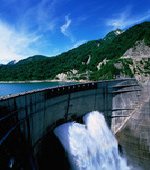 An Agenda 21 for the basin slope of north-west Tunisia
An Agenda 21 for the basin slope of north-west Tunisia
- In the past four years, Tunisia’s Ministry of Environment and Land Use has developed a National Agenda 21 that has specified the main goals of the government for sustainable development.
- Agenda 21 consists of four principles at the local, regional, and national levels: (1) integration of environmental issues in development with a multi-sectoral coordination; (2) participation of all the stakeholders; (3) information at all levels; and (4) monitoring to take into account all lessons learned into future activities of sustainable development.
- In 1995, Tunisia developed a national Agenda 21 that lists the country’s priorities in development and sustainable development. The main goals of the document are to: (1) guarantee that each sector takes into account environmental protection issues in their development activities since the start; and (2) insure that the priorities for development as selected during the planning process correspond to the real needs of the population. Tunisia has also decided to develop local Agenda 21 to take into account the local environmental issues and ensure that that the actions of sustainable development are based on local conditions
| Project number | LIFE98 TCY/TN/127 | ||
|---|---|---|---|
| Subject(s) | no translation available | ||
| Geographical coverage | Tunisia | ||
| Budget (in €) | 250000 | ||
| Programme | LIFE | ||
| Web site | http://europa.eu.int/comm/environment/life/project/Projects/index.cfm?fuseaction=home.createPage&s_ref=LIFE98%20TCY%2FTN%2F127&area=3&yr=1998&n_proj_id=1663&cfid=22932& | ||
| Objectives | - The overall objective of the project was to develop an Agenda 21 action plan for the sustainable development of the watershed in the northwest of Tunisia. | ||
| Results | - The project developed five local Agenda 21 action plans in five local communities in the Northwest region of Tunisia. At the national level, the project created a Steering Committee including representatives from 13 ministries, in charge of coordinating local initiatives. - The project also created 12 local Agenda 21 committees which rely on a participatory approach to develop local Agenda 21 action plans that promote dialogue among stakeholders (public sector, private sector, and NGOs). - Waste management was one of the main issues in the action
plans. The project trained stakeholders and promoted a greater
awareness of better waste management practices; in particular, the project
supported a study on the privatisation of the regional composting
facility. |
||
| Period | [01/03/1999 - 31/07/2001] | ||
 you are not logged in
you are not logged in





